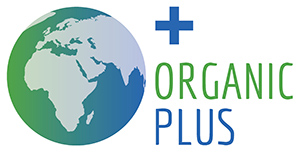Minimising the use of contentious inputs in certified organic agriculture in Europe by providing research based decision support for actors in the organic sector, including policy makers, and thus reach the next level of the organic success story
Project Aims:
Overall aim of providing high quality, trans-disciplinary, scientifically informed decision support to help all actors in the organic sector, including national and regional policy makers, to reach the next level of the organic success story in Europe. By doing so, organic food systems can be more true to organic principles.
Organic-PLUS has four objectives:
- to identify and evaluate contentious inputs currently used in European agriculture
- to provide specific technical solutions to minimise or phase-out their use
- to provide environmental, social and economic assessments of phase-out scenarios
- to disseminate and broker knowledge, ideas and results to maximise impact.
The multi-actor consortium comprises of 10 universities and 15 research organisations and NGOs from 9 EU and 3 associated countries, including scientists from a wide range of academic disciplines and involging advisors, farmers and other stakeholders in a participatory research design.
- WP PLANTS researches alternatives to copper and mineral oils used for plant protection, working on potatoes, glasshouse crops and perennial Mediterranean crops.
- WP LIVESTOCK considers the use of natural plant sources of vitamins as alternatives to synthetic products and the use of alternative and novel bedding materials in place of straw from conventional farms through in vitro experiments and replicated trials.
- WP SOIL considers alternatives to the use of manure from non-organic farms and other animal-derived fertility inputs such as blood and bone meal, including legume-based fertilisers and lternatives to peat and non-degradable plastic used as a weed supressing mulch. All experimental work is conducted in multiple European countries in close collaboration with relevant stakeholders including product manufactures and commercial farmers and growers.
- WP IMPACT collects information concerning current consumer conceptions of contentious inputs (using surveys and citizen juries), establishes a comprehensive database of key stakeholders throughout Europe and coordination of dissemination activities.
- WP MODEL develops scenarios for the phasing out of contentious inputs from organic agriculture, including environmental and sustainability assessments of the proposed alternatives using a variety of life cycle assessment tools.
- WP LEAD coordinates the project, ensuring transparent and participatory communication flow across workpackages and among the multi-actor stakeholders and with business and policy actors.
The results of the project are disseminated through a variety of different mechanisms, including peer-reviewed academic journal articles, trade and farmer-facing publications, social media, on-farm events, demonstration and training activities, conferences and policy workshops.
ORC's Role:
- Contribution to mapping of the use of contentious inputs in organic farming
- Carry out on-farm trials of dairy heifer growth and health status, using plant-based products
- Overall project contribution
Project leader and partners:
- Coventry University CU United Kingdom
- University of Thessaly UTH Greece
- Institut National de la Recherche Agronomique INRA France
- Universty of Padova UNIPD Italy
- University of Hohenheim UoH Germany
- Aarhus University AU Denmark
- Częstochowa University of Technology CUT Poland
- Landbrug & Fodevarer F.m.b.A. (SEGES) – L&S L&S Denmark
- Food and Agricultural Research Institute IRTA IRTA Spain
- IFAPA Almeria IFAPA Spain
- Ministry of Food Agriculture and Livestock MFAL Turkey
- Association of Ecological Agriculture ETO Turkey
- Norwegian Centre for Organic Agriculture NORSOK Norway
- Swiss Federal Institute for Forest, Snow and Landscape Research WSL Switzerland
- Swedish University of Agricultural Science SLU Sweden
- University or Parma UNIPR Italy
- VetAgro-Sup (ABioDoc) ABioDoc France
- Leibniz Institute for Agricultural Engineering and Bioeconomy ATB Germany
- Royal Horticultural Society RHS UK
- Soil Association SA UK
- Forschungsring FORI Germany
- Escola Agrària de Manresa ESA Spain
- Oslo and Akershus University College of Applied Sciences HIOA Norway
- University of Catania, Sicily UNICT Italy
- Organic Research Centre ORC UK
